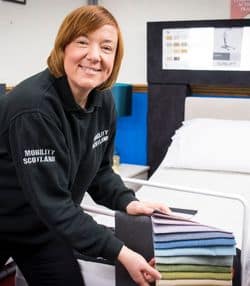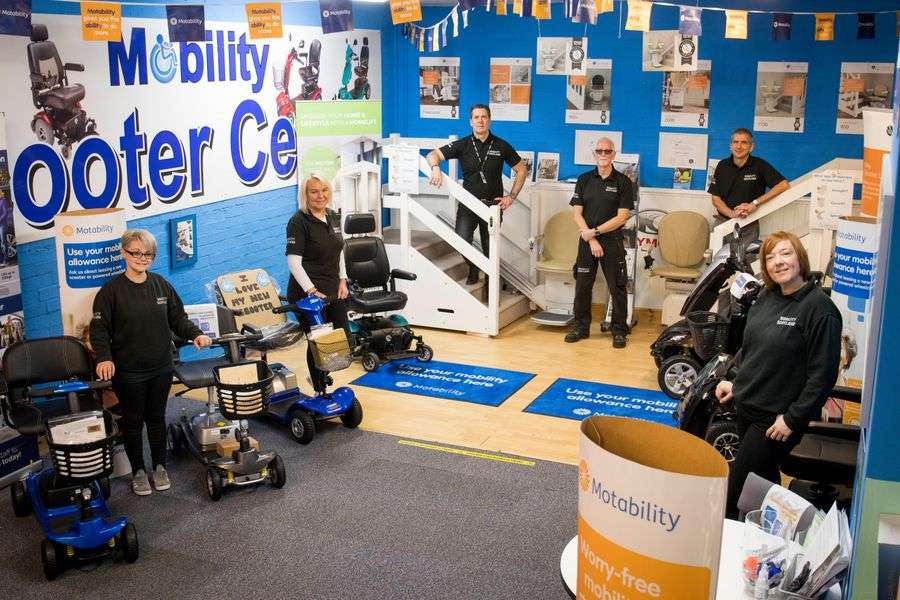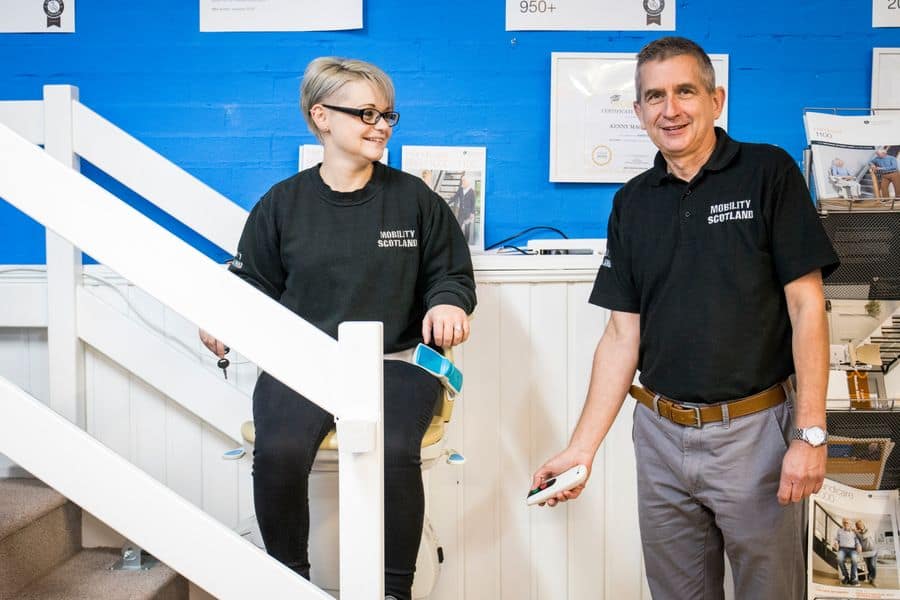Retailer Spotlight: Mobility Scotland
Mobility Scotland’s continued pursuit and refinement of its retail value proposition, centred around excellent customer service, has been the USP of this award-winning firm based in Kirkintilloch, in the northeast of central Glasgow. THIIS spoke to Billy Finnie, Operations Manager at Mobility Scotland, about the secrets of its success…
In February 2021, Mobility Scotland was recognised for its outstanding levels of customer service in the Motability Scheme’s annual awards.
Achieving ‘highly commended’ status in the ‘Powerchair and Scooter’ category, the recognition from this national scheme was all the more special because it was based on direct customer feedback from Motability Scheme customers.
Mobility Scotland and Motability are a great strategic fit, says Billy Finnie, the firm’s operations manager. “Both organisations are based on a relationship-building model which has shared customer values that does not over-promise. The customer consistently receives exactly what it says on the tin and that’s ‘hassle-free mobility’.
“If the customer is good enough to place their mobility needs and trust in our and Motability’s hands, then we will respect that decision and endeavour to do our very best to ensure we deliver on each value with great product knowledge, good product choice and technical expertise that is coupled with a friendly, stimulating customer service experience that is all delivered with a big smile.”
Of course, the need to develop an above-average service to customers was always Billy’s priority since he started out in the mobility business and it was something that he felt needed to be improved upon in Scotland at the time when he was first starting out.
Knowledge building
Billy says that the catalyst for Mobility Scotland goes way back to the early nineties when he started an apprenticeship as an occupational therapy technician for Glasgow’s citywide Disability Resource Centre. It was here that he spent “three fantastic years” fully immersed in the community equipment world.
Growing up on a Glasgow housing estate, Billy always had an entrepreneurial spirit and the desire to set up his own business. He knew that he needed experience in the world of business development and sales, though, and he spent nearly 15 years working for a blue-chip organisation honing his sales and management skills.
Billy reflects: “In the early nineties, the mobility industry was somewhat overlooked in Scotland and generally delivering average service. I felt, with my previous knowledge, I could deploy my now-developed sales and marketing skills, along with my previous knowledge of the industry, and create a truly value-adding operation.”
So, after months spent doing intensive product re-training and research, Billy started on his journey with Mobility Scotland. Investments were set up and staff were sought, he says, as he set about growing a business based on “great products, great customer service and great aftersales care.”
It all came from a belief, he says, to “improve on the what the incumbents were doing at the time and with aspirations to become true champions of the mobility product and service provision across Glasgow.”
As Operations Director, Billy remains to this day directly responsible for all sales, marketing strategy, customer service, product range and service delivery and policy.
Coping with a pandemic
The past year for Mobility Scotland has certainly been eventful. The initial impact of the COVID-19 pandemic on the business was “massive”, says Billy.
“Never did any of us think it would go so deep, so quickly. Our retail division ground to a halt overnight. Our revenue was hammered over the four months from March 2020. However, as we emerged from the first lockdown, we saw customers’ buying motivations change and attitudes towards buying our products became more assertive.”
To Billy, it seemed that the pandemic was resulting in people becoming more decisive and assertive about their independence and mobility. He noticed that key equipment to help with this, such as riser recliner chairs, profiling beds, through ceiling lifts, stairlifts and so on, were aiding this, and the products which were doing particularly well.
This has been the prevailing objective for many people, comments Billy. “It’s to make the home comfortable, accessible, safe and enjoyable, and to cut down any risk of slips, trips and falls, and potential hospitalizations. That sheer will to remain independent at home and stay out of a care home has been driving buying trends.”
Billy and the team saw some spectacular sales in the summer and autumn, he says, but this quickly tapered off again in the run-up to Christmas and the next big lockdown.
“It was like Groundhog Day, going from a vibrant bustling business to the painstakingly slow uncertainty of another lockdown.”
At the time of going to press, Billy remarks that his team of staff are literally just about to push the retail shutters up again and start to trade its way out of another very difficult period, which reduced sales in some areas by up 70 per cent.
He says: “It will be interesting to see people’s reactions, hopefully people will start venturing back on to the high streets and retail parks.”
Motability partnership
After experiencing such a difficult 2020, the award from the Motability Scheme came at a good time. Being part of Motability Scheme has brought Mobility Scotland many benefits as a business, not least an additional and steady revenue stream all-year-round.
These benefits, Billy says, have included creative marketing and promotional support, credibility through brand association, and the opportunity of word of mouth and ongoing customer referral business.
Billy adds: “And the best practices which we have learned so much from over the years, Motability do it really well. Their management team, systems and people are impressive.”
Motability is not without its frustrations though, says Billy, particularly where difficult customers with unrealistic demands are concerned. “But in general, if you are managing customer expectations, ensuring that they’re being well supported, then the scheme works very well for both customer and dealer.”
Mobility Scotland has proved its ability to excel in offering great customer service and it all comes down to the firm’s ‘value proposition’, explains Billy.
“Every member of the team knows exactly what it entails. There are 20 key actions which we can offer our customers in order for them to feel respected, valued and listened to. We ensure we work to agreed service level agreements, which gives continuity. It’s a relationship cycle that keeps the customer happy and delivers a repeat share of wallet business to Mobility Scotland.”
Perhaps the most impactful example of this, Billy says, was an initiative Mobility Scotland set up in January this year.
“We knew many of our customers’ scooters and powerchairs would have been under-used because of lockdown, with some not being used for almost a year, so we identified all vulnerable customers who lived alone (Motability and private) and gave them a call to remind them they should be checking their vehicles, ensuring batteries were being topped up with charge regularly and tyres etc. are in good shape.”
Some customers, Billy comments, could not do this for themselves so the firm offered them a free health check service so that there was no surprises and panic when the lockdown eased.
“And crucially, if they needed their vehicle in order to go for their COVID vaccinations, all would be good.”
Billy recalls that they did 19 physical checks and over 100 phone calls. “It may not seem a lot but it was a nice touch and probably ensured at least a few customers made their COVID vaccination appointment without too much drama.”
Rebooting retail
Over the past few years, the firm has set about restructuring its product range, working with fewer suppliers and the best products. Last year, Mobility Scotland set itself the tasks of rebooting its retail division further.
Explaining how he did this, Billy commented: “We rationalised our product range even further, with just about all our daily living aids (ADL) and footwear moving out of the showroom and into a mail order/signposting process. Our investment in our new appointment system is working so well it will continue into 2021.
“Our key range of products spans only five categories now and is more technically led but there is still plenty of depth, choice, and many options within that for our customers.”
The pandemic has led to many retailers embracing ecommerce but Billy does not see Mobility Scotland going down this route.
That’s not to say the business hasn’t been looking at ways to improve its online offering.
“We totally understand the consumer journey generally begins online and that is why we have invested heavily in our website redevelopment and SEO strategies. Our social channels have also become very prominent and important to our customers and business.
“We will continue to use the internet as a lead generator but we aim to engage with the customer at the earliest opportunity to begin the buying process. Our model is prospect-driven in terms of numbers – we generate leads from so many platforms – but it is about relationship building in terms of closing the sales.
“This way, we can ensure the correct product is recommended and it protects our business, and customers are willing to pay for those additional service elements which, at the end of the day, guarantee healthy margins.”
A call for regulation
The mobility sector has its own set of challenges and Billy sees this as perhaps the major challenge going forward. “That perpetual race-to-the-bottom we have seen within the industry over past 10 years or so has taken its toll.
“The industry has been economically damaged and perceptually tainted. If we continued down this road, the gap between good needs analysis, appropriate recommendations, consumer safety and value for money, service and ongoing support will get bigger and even more damaging for the consumer.”
Competitiveness, Billy believes, is generally good news for shoppers, but not at the risk of spending money on a product which could put them, and others, at risk and subsequently drains their wallets as they realise the pitfalls of the false economy purchase.
It turns the shopping experience into something very disappointing and negative, says Billy. “There will be tens of thousands of examples of families across the country who have a story to tell about a poor online experience when purchasing a mobility product, with garages and sheds still cluttered with inappropriately sold products as they were refused a refund or return when they realised it was not the right solution.
“This isn’t just bad for the consumer, it cannot be great for manufacturers to see their products being overhyped, undervalued and inappropriately sold, and of course it will be retailers who generally pick up the pieces and suffer downward margin pressure operating on razor-thin margins.”
A great example of how to overcome this way of working, comments Billy, is through learning from organisations like Handicare, which wants to develop proper working relationships with their suppliers and dealers.
Says Billy: “Handicare is promoting a mutually beneficial collaborative approach through its Trusted Partner Programme, working hand-in-glove to protect its products, the consumers and aid positive growth within the partner base.”
Billy maintains, however, that both online and bricks-and-mortar businesses can operate side by side but this must be in healthier competition.
He adds: “Regulation is probably the best way of repositioning the industry for modern 21st century demands, which demographically has changed with an increased ageing population being subjected to dated 20th century practices.”
Recruitment drive
This year, Mobility Scotland is looking at recruiting new people in line with the calibre of staff it currently has, says Billy.
“We have great people who are stakeholders in our future success and our growth plans will need even more people of a similar calibre, which will be difficult. We’re not just looking for an employee, we’re looking for a collaborative business partner.”
The business is also looking at developing as a true champion in the more complex technical sectors within the industry, says Billy.
“Our technical division within Mobility Scotland is growing at great pace and we’re so proud of where we have taken our stairlift division in particular, from a standing start to a profit-generating division projecting circa half a million pounds by the end of this fiscal year.
“The team and resources we have in place now are highly experienced, dedicated to the role and committed to the cause. This growth will rapidly continue as we aim to recruit more fantastic people with an engineering and sales background within the stairlift and through-ceiling lift world.”






